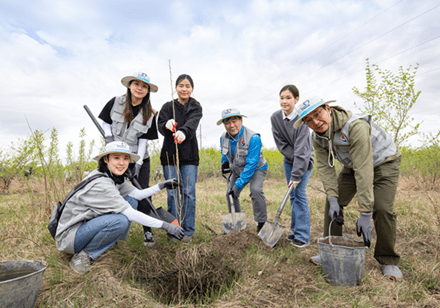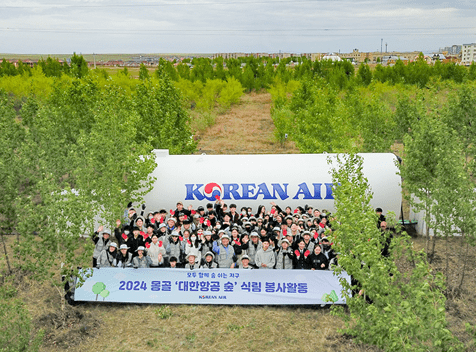 Korean Air celebrated the 20th anniversary of its “Korean Air Forest” initiative in Baganuur, Mongolia. This reforestation project, aimed at combating desertification, has resumed after a four-year hiatus due to the pandemic.
Korean Air celebrated the 20th anniversary of its “Korean Air Forest” initiative in Baganuur, Mongolia. This reforestation project, aimed at combating desertification, has resumed after a four-year hiatus due to the pandemic.
A ceremony was held on May 28 in Baganuur, Ulaanbaatar, to commemorate the anniversary. “We started planting trees here 20 years ago, and both Korea and Mongolia have been steadily cultivating the Korean Air Forest together,” said Sumiya Davaasüren, the governor of Baganuur District. “I would like to thank the Korean Air team and all participants in the project on behalf of Baganuur for creating a forest to prevent desertification and the spread of yellow dust.” Davaasüren also presented Korean Air with a plaque of appreciation and took pictures with local residents and employees who participated in this year’s planting event.
Initiated in 2004, each year, a group of 100 to 200 airline employees take part in the Korean Air Forest afforestation effort. The project was temporarily suspended in 2020 due to pandemic restrictions, during which time local forestry experts and residents maintained the forest.
This year, 112 volunteers from the airline, including new hires, resumed planting activities over two weeks starting from May 20.
Korean Air Forest acts as barrier protecting local villages from coal mine dust
Baganuur District is located 130 kilometers from Ulaanbaatar. A coal mining region spanning approximately 31 square kilometers, it supplies about 60% of Mongolia’s coal demand. Prior to the forest planting, coal dust from open-pit mines affected local villages. Recognizing the need for afforestation, Korean Air began planting trees to eventually cover an area of 44 hectares, or approximately 82 football fields.
Currently, the Korean Air Forest is home to over 125,300 trees of 12 species including poplars, Siberian elms, sea buckthorn, and willows, which can thrive in harsh environments. In 2019, an automated watering system was installed to ensure the trees had stable conditions to grow. As a result, the tree growth rate is 95%, with the tallest tree reaching 12 meters.
The forest, which stretches 2 kilometers long and 222 meters wide, acts as a barrier to block dust and debris from nearby coal mines, and the ecosystem is gradually being restored as various wildlife such as insects, skylarks, rabbits and foxes make Korean Air forest their home. It also serves as a venue for local students’ picnics and field trips.
Giving back to the community in Mongolia
Korean Air is actively involved in giving back to the Mongolian community. The airline has donated computer classrooms to seven schools in the area and provided medical services to the community in cooperation with Inha University Hospital.
In 2006, Baganuur District was recognized by the Mongolian government as a model city for green space creation and highlighted the Korean Air Forest as an exemplary eco-friendly volunteer project. In 2009, Korean Air received the Medal of Excellence from the Mongolian Ministry of Environment and Tourism.















